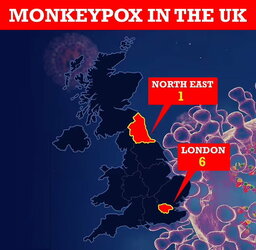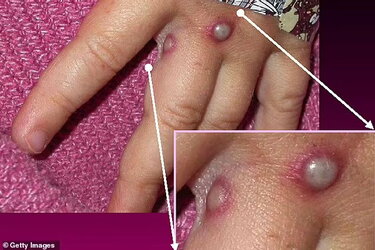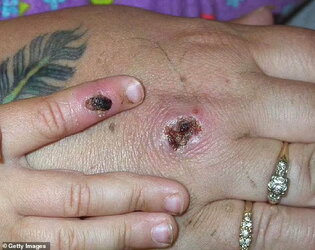Article (Archive)
The report said: 'The epidemic risk for humans is considered to be small.'
Four more people have been diagnosed with monkeypox in the UK, bringing the total number of cases in the latest outbreak to seven.
All four new patients are gay or bisexual men who were infected in London and had no travel links to Africa, health chiefs have confirmed after MailOnline broke the news earlier today.
Two are known to each other but have no connection to any of the previous cases, in a sign the virus is spreading in the community for the first time.
Nurses and doctors are being advised to stay 'alert' to patients who present with a new rash.
Monkeypox is often mistaken for more common rash illnesses like chickenpox, measles, scabies and syphilis, which makes it difficult to diagnose early.
Dr Susan Hopkins, chief medical adviser at the UK Health Security Agency (UKHSA), said: 'This is rare and unusual.
'UKHSA is rapidly investigating the source of these infections because the evidence suggests that there may be transmission of the monkeypox virus in the community, spread by close contact.
'We are particularly urging men who are gay and bisexual to be aware of any unusual rashes or lesions and to contact a sexual health service without delay.'
All seven UK cases have tested positive for the West African strain of the virus, which is believed to be milder than other versions.

Six of the seven cases were diagnosed in London while one is being treated at a specialist unit in Newcastle

Monkeypox is a rare viral infection which causes unusual rashes or lesions (shown in a handout provided by the Centers for Disease Control and Prevention (CDC) in the US
Exactly how the new patients acquired the infection 'remains under urgent investigation', the UKHSA said.
The rare viral infection which kills up to one in ten of those infected but does not spread easily between people. It is transmitted via respiratory droplets during prolonged face-to-face contact or bodily fluids.
MailOnline has learned that at least one sexual health clinic in West London had started implementing tougher infection control measures this morning, including a one-metre social distancing rule in waiting rooms.
A source told MailOnline that some health teams were breaking ranks from national guidance and 'perhaps putting in measures locally'.
The UKHSA announced on May 7 that a person who had recently travelled to Nigeria had contracted the infection.
It was believed they contracted the illness in Nigeria, where monkeypox is endemic, before travelling to the UK.
Two more cases were announced on Saturday, in two individuals who lived in the same household but were not linked to the initial case.

Nurses and doctors are being advised to stay 'alert' to patients who present with a new rash or scabby lesions (like above)
The rare tropical disease, which causes flu-like symptoms and blisters on the skin, is caused by a virus spread by monkeys, rats, squirrels and other small mammals.
A World Health Organization report last year suggested the natural R rate of the virus – the number of people each patient would infect if they lived normally while sick – is two.
But the real rate is likely much lower because 'distinctive symptoms greatly aid in its early detection and containment,' the team said, meaning it's easy to spot cases and isolate them.
Up to 10 per cent of people who become ill with monkeypox will die and most deaths from the virus occur in younger age groups, according to the WHO.
The first case of monkeypox in a human was recorded in 1970 in the Democratic Republic of the Congo and has since been detected in a number of central and wester African countries.
Most cases are reported in the DRC and Nigeria.
In 2003, the disease was detected in the US when an outbreak occurred following the importation of rodents from Africa.
The first cases were detected in the UK in 2018, when three people contracted the virus after a man travelled back from Nigeria including an NHS nurse who had been caring for a patient and blamed her PPE.
The incident meant more than 50 people were warned they had been exposed to the potentially deadly virus however no other cases were recorded from that outbreak.
A further case was detected in London in December 2019 and another two cases were detected in North Wales in 2021. All cases were thought to have been caught by travellers who had been to Nigeria.
A WHO report in 2020 explained that human-to-human transmission of the virus is rare and that the longest chain of cases appears to only have been six people before it ended.
All four new patients are gay or bisexual men who were infected in London and had no travel links to Africa, health chiefs have confirmed after MailOnline broke the news earlier today.
Two are known to each other but have no connection to any of the previous cases, in a sign the virus is spreading in the community for the first time.
Nurses and doctors are being advised to stay 'alert' to patients who present with a new rash.
Monkeypox is often mistaken for more common rash illnesses like chickenpox, measles, scabies and syphilis, which makes it difficult to diagnose early.
Dr Susan Hopkins, chief medical adviser at the UK Health Security Agency (UKHSA), said: 'This is rare and unusual.
'UKHSA is rapidly investigating the source of these infections because the evidence suggests that there may be transmission of the monkeypox virus in the community, spread by close contact.
'We are particularly urging men who are gay and bisexual to be aware of any unusual rashes or lesions and to contact a sexual health service without delay.'
All seven UK cases have tested positive for the West African strain of the virus, which is believed to be milder than other versions.

Six of the seven cases were diagnosed in London while one is being treated at a specialist unit in Newcastle

Monkeypox is a rare viral infection which causes unusual rashes or lesions (shown in a handout provided by the Centers for Disease Control and Prevention (CDC) in the US
Exactly how the new patients acquired the infection 'remains under urgent investigation', the UKHSA said.
The rare viral infection which kills up to one in ten of those infected but does not spread easily between people. It is transmitted via respiratory droplets during prolonged face-to-face contact or bodily fluids.
MailOnline has learned that at least one sexual health clinic in West London had started implementing tougher infection control measures this morning, including a one-metre social distancing rule in waiting rooms.
A source told MailOnline that some health teams were breaking ranks from national guidance and 'perhaps putting in measures locally'.
The UKHSA announced on May 7 that a person who had recently travelled to Nigeria had contracted the infection.
It was believed they contracted the illness in Nigeria, where monkeypox is endemic, before travelling to the UK.
Two more cases were announced on Saturday, in two individuals who lived in the same household but were not linked to the initial case.

Nurses and doctors are being advised to stay 'alert' to patients who present with a new rash or scabby lesions (like above)
The rare tropical disease, which causes flu-like symptoms and blisters on the skin, is caused by a virus spread by monkeys, rats, squirrels and other small mammals.
A World Health Organization report last year suggested the natural R rate of the virus – the number of people each patient would infect if they lived normally while sick – is two.
But the real rate is likely much lower because 'distinctive symptoms greatly aid in its early detection and containment,' the team said, meaning it's easy to spot cases and isolate them.
Up to 10 per cent of people who become ill with monkeypox will die and most deaths from the virus occur in younger age groups, according to the WHO.
The first case of monkeypox in a human was recorded in 1970 in the Democratic Republic of the Congo and has since been detected in a number of central and wester African countries.
Most cases are reported in the DRC and Nigeria.
In 2003, the disease was detected in the US when an outbreak occurred following the importation of rodents from Africa.
The first cases were detected in the UK in 2018, when three people contracted the virus after a man travelled back from Nigeria including an NHS nurse who had been caring for a patient and blamed her PPE.
The incident meant more than 50 people were warned they had been exposed to the potentially deadly virus however no other cases were recorded from that outbreak.
A further case was detected in London in December 2019 and another two cases were detected in North Wales in 2021. All cases were thought to have been caught by travellers who had been to Nigeria.
A WHO report in 2020 explained that human-to-human transmission of the virus is rare and that the longest chain of cases appears to only have been six people before it ended.
The report said: 'The epidemic risk for humans is considered to be small.'
Last edited by a moderator: